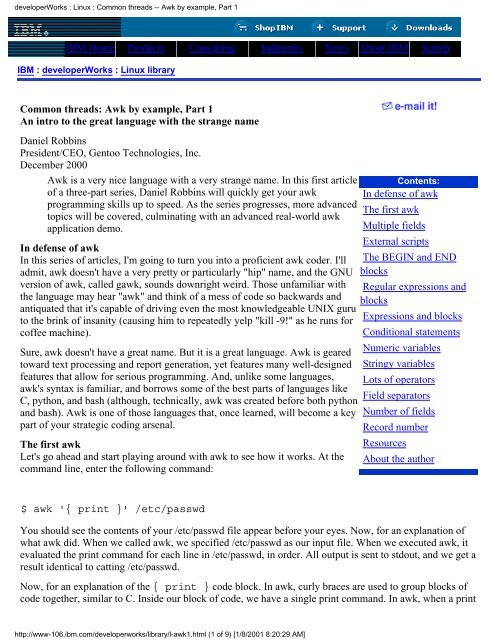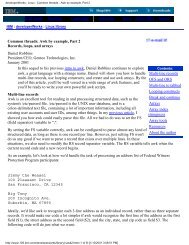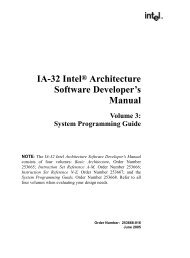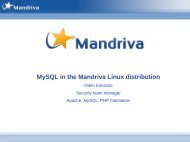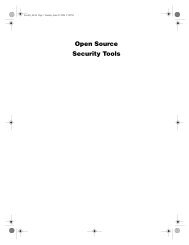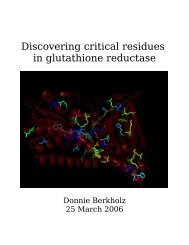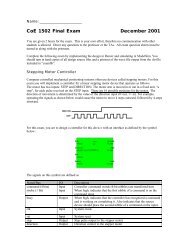Awk by example, Part 1 - Gentoo
Awk by example, Part 1 - Gentoo
Awk by example, Part 1 - Gentoo
You also want an ePaper? Increase the reach of your titles
YUMPU automatically turns print PDFs into web optimized ePapers that Google loves.
Russia p. 7members, ages 16 to 50. They hold services twice a month. Most services are lay-led althoughsome UU ministers from other countries have participated in the Guest Minister Project and haveled services. Sermons are also sent <strong>by</strong> email to members. Unitarianism in Russia is not an officialreligion. Russian law requires a 15-year probation period for new religious organizations. TheUnitarians in Russia hope to register first as a secular organization and after a year of “positiveeducational work, to apply for registration [as a religion]” (www.iccu.net, 2004). Although theymay at times feel discouraged, the Unitarians in Russia are a hardworking, dedicated group.
developerWorks : Linux : Common threads -- <strong>Awk</strong> <strong>by</strong> <strong>example</strong>, <strong>Part</strong> 1FS="[[:space:]+]"While this assignment will do the trick, it's not necessary. Why? Because <strong>by</strong> default, FS is set to a singlespace character, which awk interprets to mean "one or more spaces or tabs." In this particular <strong>example</strong>, thedefault FS setting was exactly what you wanted in the first place!Complex regular expressions are no problem. Even if your records are separated <strong>by</strong> the word "foo,"followed <strong>by</strong> three digits, the following regular expression will allow your data to be parsed properly:FS="foo[0-9][0-9][0-9]"Number of fieldsThe next two variables we're going to cover are not normally intended to be written to, but are normallyread and used to gain useful information about the input. The first is the NF variable, also called the"number of fields" variable. <strong>Awk</strong> will automatically set this variable to the number of fields in the currentrecord. You can use the NF variable to display only certain input lines:NF == 3 { print "this particular record has three fields: " $0 }Of course, you can also use the NF variable in conditional statements, as follows:{}if ( NF > 2 ) {print $1 " " $2 ":" $3}Record numberThe record number (NR) is another handy variable. It will always contain the number of the current record(awk counts the first record as record number 1). Up until now, we've been dealing with input files thatcontain one record per line. For these situations, NR will also tell you the current line number. However,when we start to process multi-line records later in the series, this will no longer be the case, so be careful!NR can be used like the NF variable to print only certain lines of the input:(NR < 10 ) || (NR > 100) { print "We are on record number 1-9 or 101+" }Another <strong>example</strong>:http://www-106.ibm.com/developerworks/library/l-awk1.html (8 of 9) [1/8/2001 8:20:29 AM]
developerWorks : Linux : Common threads -- <strong>Awk</strong> <strong>by</strong> <strong>example</strong>, <strong>Part</strong> 1{}#skip headerif ( NR > 10 ) {print "ok, now for the real information!"}<strong>Awk</strong> provides additional variables that can be used for a variety of purposes. We'll cover more of thesevariables in later articles.We've come to the end of our initial exploration of awk. As the series continues, I'll demonstrate moreadvanced awk functionality, and we'll end the series with a real-world awk application. In the meantime, ifyou're eager to learn more, check out the resources listed below.Resources● If you'd like a good old-fashioned book, O'Reilly's sed & awk, 2nd Edition is a wonderful choice.●●●●Be sure to check out the comp.lang.awk FAQ. It also contains lots of additional awk links.Patrick Hartigan's awk tutorial is packed with handy awk scripts.Thompson's TAWK Compiler compiles awk scripts into fast binary executables. Versions areavailable for Windows, OS/2, DOS, and UNIX.The GNU <strong>Awk</strong> User's Guide is available for online reference.About the authorResiding in Albuquerque, New Mexico, Daniel Robbins is the President/CEO of <strong>Gentoo</strong> Technologies, Inc.,the creator of <strong>Gentoo</strong> Linux, an advanced Linux for the PC, and the Portage system, a next-generationports system for Linux. He has also served as a contributing author for the Macmillan books CalderaOpenLinux Unleashed, SuSE Linux Unleashed, and Samba Unleashed. Daniel has been involved withcomputers in some fashion since the second grade, when he was first exposed to the Logo programminglanguage as well as a potentially dangerous dose of Pac Man. This probably explains why he has sinceserved as a Lead Graphic Artist at SONY Electronic Publishing/Psygnosis. Daniel enjoys spending timewith his wife, Mary, and his new ba<strong>by</strong> daughter, Hadassah. You can reach Daniel at drobbins@gentoo.org.What do you think of this article?Killer! (5) Good stuff (4) So-so; not bad (3) Needs work (2) Lame! (1)Comments?Privacy LegalContacthttp://www-106.ibm.com/developerworks/library/l-awk1.html (9 of 9) [1/8/2001 8:20:29 AM]


